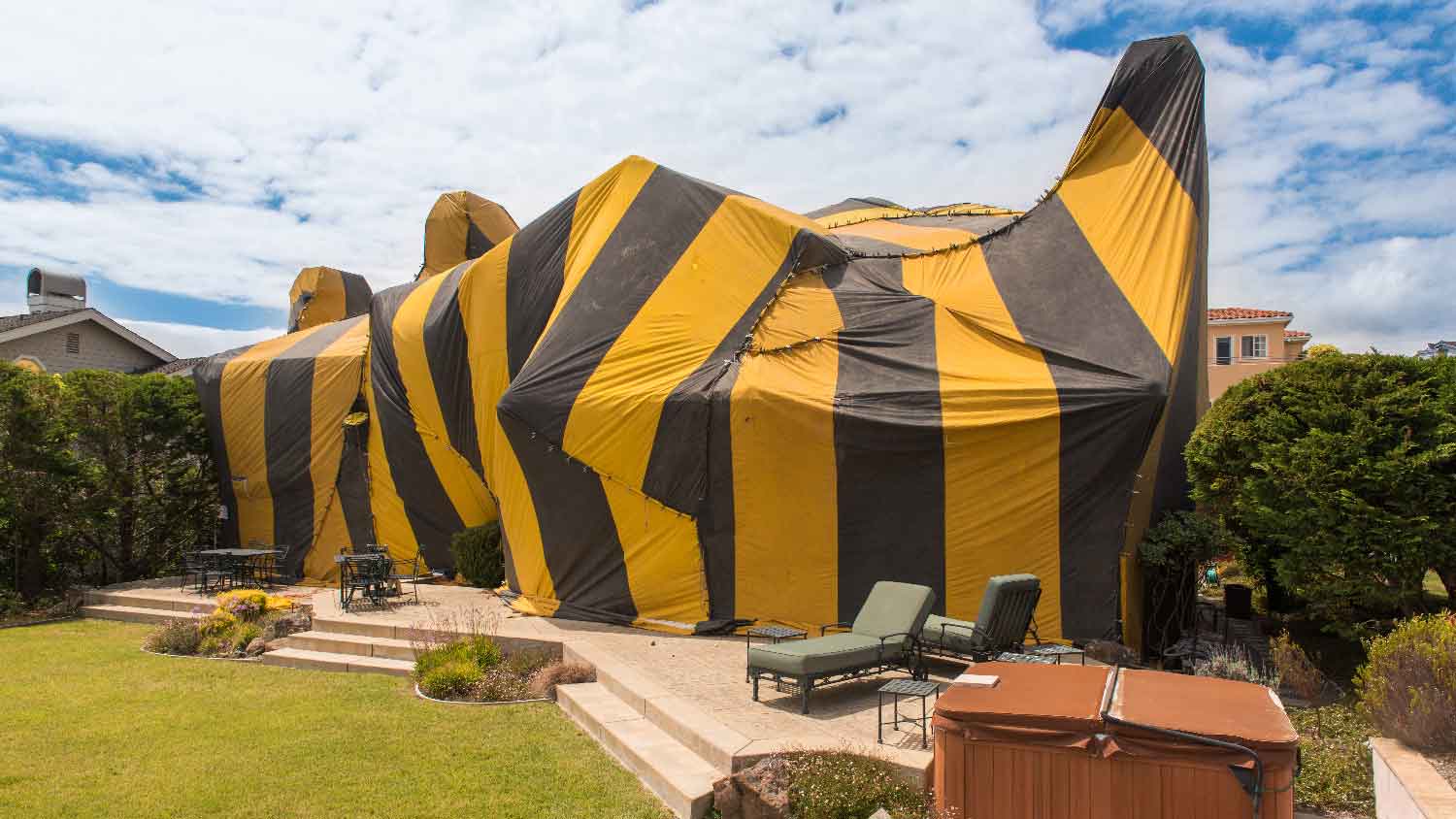
Moth infestations can cause damage to items in your home. Learn how much moth extermination costs and ways to save in this informative guide.
Pest control costs depend on your project and location. Check with a local pro for your specific job.
Larger homes cost more to treat for earwig infestations because they require more products and labor.
Frequent or severe earwig infestations need multiple treatments, increasing the total price.
Pest control pros usually charge a flat rate based on home size and infestation level.
Regular quarterly treatments help prevent earwigs from returning and reduce long-term expenses.
The cost to remove earwigs from your home can vary based on factors like the size of your home and how often treatment is needed. Most homeowners pay around $300 for professional earwig extermination. Prices can be as low as $75 for smaller problems or go up to $600 for more severe or recurring infestations. On average, you can expect to pay between $150 and $400 for a standard treatment.
Earwigs may not be dangerous, but their presence in your home can be unnerving, to say the least. To get rid of the insects ASAP and help prevent them from returning, investing in a professional exterminator is the best option.
Here are the main factors to consider when estimating the cost of pest control services for earwigs.
Pest control services are safe and effective for managing earwigs, but the severity of the infestation can significantly impact the total cost. A minor earwig issue may be resolved with a single visit, while a severe infestation might require multiple treatments and ongoing monitoring. The more widespread or persistent the problem, the more time and resources professionals will need to fully eliminate the pests and prevent future infestations.
The size of your home impacts the overall cost of earwig extermination. Larger spaces require more time, labor, and treatment products, which increases the price. Here is a breakdown of average extermination costs based on home size to help you estimate your potential expenses.
| Home Size in Square Feet | Average Earwig Extermination Cost |
|---|---|
| 1,000 | $85 |
| 1,500 | $175 |
| 2,000 | $275 |
| 2,500 | $325 |
Determining the ideal treatment schedule for earwig extermination depends on how often you’re seeing signs of a bug infestation. Below is a breakdown of typical treatment frequencies and their average costs.
| Frequency of Treatment | Average Cost per Treatment |
|---|---|
| Weekly | $60–$90 |
| Biweekly | $75–$110 |
| Monthly | $100–$150 |
| Quarterly | $150–$250 |
| Semiannually | $200–$300 |
| One time | $150–$400 |
An earwig pest inspection costs $75 to $150 on average. Many professional exterminators will waive this expense or credit it to your bill if you move forward with service.
A local exterminator charges an average of between $75 and $150 per hour, but most services are billed as a flat rate per visit. The final cost depends more on the treatment type and coverage area than on time spent at your home.
Tipping isn’t expected for pest control services, but it can be a kind and generous way to recognize exceptional work. While routine visits usually don’t call for a tip, a one-time treatment (especially one that involves tough conditions like crawl spaces or attics) might warrant a $10 to $20 tip per technician. Alternatively, offering a cold drink or snack is a thoughtful way to say thank you without cash.

The frequency of your earwig treatments depends on the severity of the problem. For most homes, quarterly service is enough to keep earwigs under control. However, if you’re seeing them often or have had major issues in the past, monthly or biweekly pest control services are worth the extra investment.
A one-time treatment can work for small problems, but follow-ups may be necessary to keep them from coming back. A pest control pro can help you choose the best schedule for your home.
If you want to save money by bundling pest control costs, consider the following services:
Cost to exterminate cockroaches: $100–$600
Cost to exterminate bed bugs: $1,000–$4,000
Cost to exterminate rodents: $180–$600
Cost to exterminate ants: $100–$500
Cost to exterminate fleas: $100–$400
Cost to eliminate termites: $250–$1,000
Cost to exterminate spiders: $100–$500
Cost to exterminate wasps: $300–$700
Cost to remove beehives: $150–$500
Cost to remove mosquitoes: $350–$500
Cost to remove bats: $230–$700
Cost to remove armadillos: $175–$500
Cost to remove gnats: $150–$250
Cost to remove snakes: $130–$600
Cost to remove spotted lanternfly: $200–$600
DIY earwig extermination methods can be an effective and affordable way to deal with minor earwig infestations. Sticky earwig traps are around $10 and can help catch stray insects, while diatomaceous earth dehydrates and kills insects, costing around $30 or $40. Spray pesticides are an option as well, costing around $30 per bottle. Remember to always follow the manufacturer’s instructions carefully and do not use them in areas accessible to children or pets.
While you can save money by DIY-ing, if you’re seeing a lot of earwigs around, dealing with an infestation on your own can be a challenging and ongoing process. Local pest control specialists use commercial-grade products and targeted strategies that reach deep into places where earwigs hide, such as wall voids, basements, and crawl spaces. While hiring a pro costs more upfront, it will save time, help prevent repeated infestations, and provide peace of mind that the icky insects are completely gone.
Follow these cost-savings tips to reduce your pest control costs:
Seal your home’s perimeter: Reduce the need for repeat treatments by sealing cracks, gaps, and vents where earwigs may be entering.
Get multiple quotes: Obtain at least three quotes from different pest control services to find the best deal.
Opt for Preventative Treatments: Routine maintenance treatments may cost less over time than major treatments after a full-blown infestation.
Ask about bundling services: If you have any other pest issues, bundling your services can get you discounts.
Address moisture issues: Find hidden leaks in your home and address them, and consider using a dehumidifier to make your home drier and less appealing to moisture-loving earwigs.
Clean up outdoor clutter: Removing mulch, leaves, and wet wood near your foundation can stop earwigs from settling close to your home.
Keep the spiders around: Consider peacefully coexisting with the spiders in your home, as they will gladly trap and eat earwigs.
Bring on the birds: Invite more birds to your yard by adding feeders and/or a shallow water feature, as they are another natural predator of the earwig.
Home is the most important place on earth, which is why Angi has helped more than 150 million homeowners transform their houses into homes they adore. To help homeowners with their next project, Angi provides readers with the most accurate cost data and upholds strict editorial standards. We extensively research project costs to develop the pricing data you see, so you can make the best decisions for you and your home. We rely on reputable sources, including the U.S. Bureau of Labor Statistics, academic journals, market studies, and interviews with industry experts—all to ensure our prices reflect real-world projects.
Want to help us improve our cost data? Send us a recent project quote to [email protected]. Quotes and personal information will not be shared publicly.
From average costs to expert advice, get all the answers you need to get your job done.

Moth infestations can cause damage to items in your home. Learn how much moth extermination costs and ways to save in this informative guide.

Whether you have bugs, bats, or rodents invading your home, you’ll want to contact an exterminator quickly. Find out how much pest control costs in Columbus, OH.

Tenting is a costly but effective way to exterminate termites. Learn the average termite tenting cost and everything that will factor into your budget.

While there are thousands of species of roaches in the world, these are the 10 common types to watch out for. Defend your home with knowledge and practical tips.

Bats love to roost in your attic, walls, and throughout your property. Here are some tips on safely and humanely removing them from your home.

Knowing how to get rid of mice in the walls involves taking preventative measures. Our DIY guide explains how to banish these rodents for good.